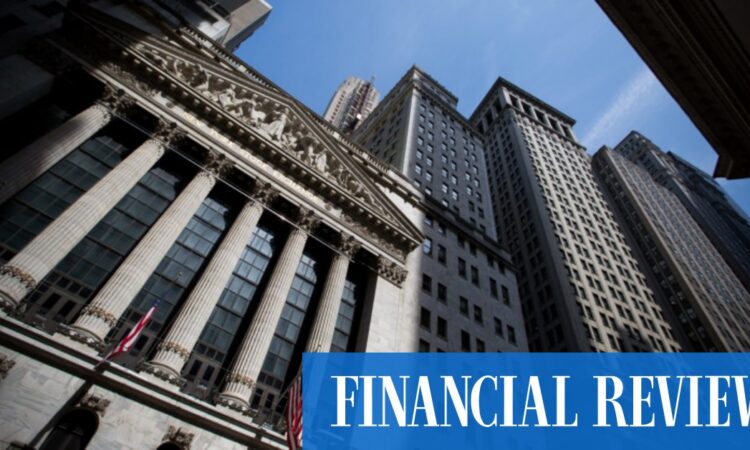
On Wall Street, financials led nine of the S&P 500’s industry sectors lower. Real estate and utilities were higher. The VIX leapt more than 9 per cent, edging above 20.
Western Alliance says ‘no truth’ to report of deal talks Western Alliance said it’s not exploring a sale nor has it hired an adviser to explore options, adding the report “is categorically false in all respects”.
Goldman says US is investigating its work for Silicon Valley Bank Goldman said it was “cooperating with and providing information” to unnamed governmental bodies reviewing SVB’s collapse in March.
The European Central Bank lifted its key rate a quarter point, as expected, to 3.25 per cent and president Christine Lagarde made clear that more rate rises, albeit at a slower pace, should be expected.
Shares in Apple were 1.4 per cent higher in after hours trading, as investors awaited the start of the company’s conference call.
Wedbush Securities on Apple’s results: “Apple delivered a strong Lebron-like March quarter which the company saw beats on the top and bottom lines as that will be the focus of the tech universe with Cupertino a key barometer of overall consumer spending globally and for China in particular.”
Today’s agenda
Local: RBA Statement on Monetary Policy at 11.30am AEST; Housing finance March at 11.30am AEST
Overseas data: NZ April retail card spending at 8.45am AEST; China April Caixin services PMI at 11.45am AEST; Eurozone March retail sales; Germany March factory orders; US April jobs report at 10.30pm AEST
Other top stories
Investors punish NAB for profit pain The bank’s shares closed 6.4 per cent lower as investors fretted about competition eating into revenue and rising funding costs.
PwC boss under fire over tax leaks scandal The future of PwC Australia chief executive Tom Seymour is under a cloud over a tax leak scandal that emanated from the division he ran inside the nation’s largest consulting firm.
‘Game on’: Aus-UK FTA good to go, Albo renews push for EU deal Albanese says he and UK PM Sunak have set a May 31 start for the Aus-UK trade deal, as he personally lobbies European leaders to land the bigger fish.
Debt interest bill slowing but still more than $110b Debt interest payments have fallen since the October estimates, but are still the second-fastest growing area of expenditure.
Market highlights
ASX futures down 31 points or 0.43% to 7160 near 7am AEST
- AUD +0.3% to 66.91 US cents
- Bitcoin +1.2% to $US28,887 at 7.04am AEST
- On Wall St: Dow -0.9% S&P -0.7% Nasdaq -0.5%
- In New York: BHP -0.03% Rio -0.9% Atlassian +3.4%
- Tesla +0.4% Apple -1% Amazon +0.3%
- PacWest -50.6% Western Alliance -38.5% Zions -12.1%
- In Europe: Stoxx 50 -0.5% FTSE -1.1% CAC -0.9% DAX -0.5%
- Spot gold +0.4% to $US2046.23/oz at 2.21pm in New York
- Brent crude +0.7% to $US72.80 a barrel
- Iron ore -2.4% to $US98.85 a tonne
- 10-year yield: US 3.38% Australia 3.30% Germany 2.19%
- US prices as of 4.59pm in New York
United States
Almost half of US adults say they’re worried about the safety of their deposits in banks and other financial institutions – levels of concern as high or higher than during the 2008 financial crisis.
A Gallup poll released this week shows 48 per cent of Americans are very or moderately worried about their money following the worst spate of bank failures in 15 years. Only 20 per cent say they’re not worried at all.
Most Americans don’t have the financial resources to cover a surprise expense of $US400 without taking on debt, according to a new survey.
Just over one-third of respondents said they have cash on hand to cover the expense, and the figure rises to 48 per cent when including those who said they’d use a credit card but pay it off immediately before incurring interest charges, according to a poll conducted by decision intelligence company Morning Consult for Bloomberg News.
Among the remainder, most said they’d borrow via cards or some other kind of debt to meet the expense, while 17 per cent said they would not be able to pay it at all.
Commodities
Bank of America sees trouble for iron ore: “Iron ore shipments usually have a weak start to the year seasonally, but then accelerate through spring and summer. Exports from Brazil have been particularly challenged YTD, but more volumes should hit the market in the coming months.
“Overall, we expect shipments to hold up throughout the year, as major miners have kept production guidance unchanged and we factor in 7 million tonnes of additional iron ore supply in calendar year 2023 from the four major producers (it is worth keeping in mind that supply from Australia/ Brazil is seasonal, so can increase by up to 40Mt between 1Q and 3Q). This suggests to us that, beyond the upside from re-stocking, which may boost iron ore demand by 70Mt (this assumes a restock to the maximum levels seen in the past), fundamentals will ultimately weaken. As such, we think iron ore should come under sustained pressure as we approach 2024.”
Bofa estimates iron ore will average $US98 a tonne in 2023, then $US79 a tonne in 2024.



